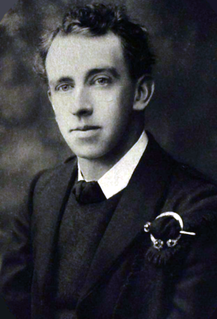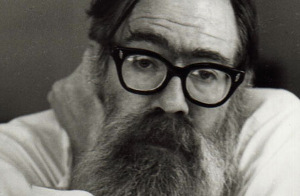A Quote by Friedrich Nietzsche
The Great Man... is colder, harder, less hesitating, and without fear of 'opinion'; he lacks the virtues that accompany respect and 'respectability,' and altogether everything that is the 'virtue of the herd.' If he cannot lead, he goes alone... He knows he is incommunicable: he finds it tasteless to be familiar... When not speaking to himself, he wears a mask. There is a solitude within him that is inaccessible to praise or blame.
Related Quotes
When a man walks in the fear of God he knows no fear, even if he were to be surrounded by wicked men. He has the fear of God within him and wears the invincible armor of faith. This makes him strong and able to take on anything, even things which seem difficult or impossible to most people. Such a man is like a giant surrounded by monkeys, or a roaring lion among dogs and foxes. He goes forward trusting in the Lord and the constancy of his will to strike and paralyze his foes. He wields the blazing club of the Word in wisdom.
My conception of the audience is of a public each member of which is carrying about with him what he thinks is an anxiety, or a hope, or a preoccupation which is his alone and isolates him from mankind and in this respect at least the function of a play is to reveal him to himself so that he may touch others by virtue of the revelation of his mutuality with them. If only for this reason I regard the theater as a serious business, one that makes or should make man more human, which is to say, less alone.
Let him who cannot be alone beware of community... Let him who is not in community beware of being alone... Each by itself has profound perils and pitfalls. One who wants fellowship without solitude plunges into the void of words and feelings, and the one who seeks solitude without fellowship perishes in the abyss of vanity, self-infatuation and despair.
Man... knows only when he is satisfied and when he suffers, and only his sufferings and his satisfactions instruct him concerning himself, teach him what to seek and what to avoid. For the rest, man is a confused creature; he knows not whence he comes or whither he goes, he knows little of the world, and above all, he knows little of himself.
An artist is he who has his center within himself. He who lacks this must choose a particular leader and mediator outside of himself, not forever, however, but only at first. For man cannot exist without a living center, and if he does not have it within himself, he may seek it only in a human being. Only a human being and his center can stimulate and awaken that of another.
The real meaning of persona is a mask, such as actors were accustomed to wear on the ancient stage; and it is quite true that no one shows himself as he is, but wears his mask and plays his part. Indeed, the whole of our social arrangements may be likened to a perpetual comedy; and this is why a man who is worth anything finds society so insipid, while a blockhead is quite at home in it.
Solitude is the profoundest fact of the human condition. Man is the only being who knows he is alone, and the only one who seeks out another. His nature - if that word can be used in reference to man, who has ‘invented’ himself by saying ‘no’ to nature - consists in his longing to realize himself in another. Man is nostalgia and a search for communion. Therefore, when he is aware of himself he is aware of his lack of another, that is, of his solitude.
They who assert the purest right, and consequently are most dangerous to a corrupt State, commonly have not spent much time accumulating property. The rich man is always sold to the institution which makes him rich. Absolutely speaking, the more money, the less virtue; for money comes between a man and his objects, and obtains them for him; and it was certainly no great virtue to obtain it.
You need not fear me, for I not only should think it wrong to marry a man that was deficient in sense or in principle, but I should never be tempted to do it; for I could not like him, if he were ever so handsome, and ever so charming, in other respects; I should hate him—despise him—pity him—anything but love him. My affections not only ought to be founded on approbation, but they will and must be so: for, without approving, I cannot love. It is needless to say, I ought to be able to respect and honour the man I marry, as well as love him, for I cannot love him without.
There is no deception on the part of the woman, where a man bewilders himself: if he deludes his own wits, I can certainly acquit the women. Whatever man allows his mind to dwell upon the imprint his imagination has foolishly taken of women, is fanning the flames within himself -- and, since the woman knows nothing about it, she is not to blame. For if a man incites himself to drown, and will not restrain himself, it is not the water's fault.








































